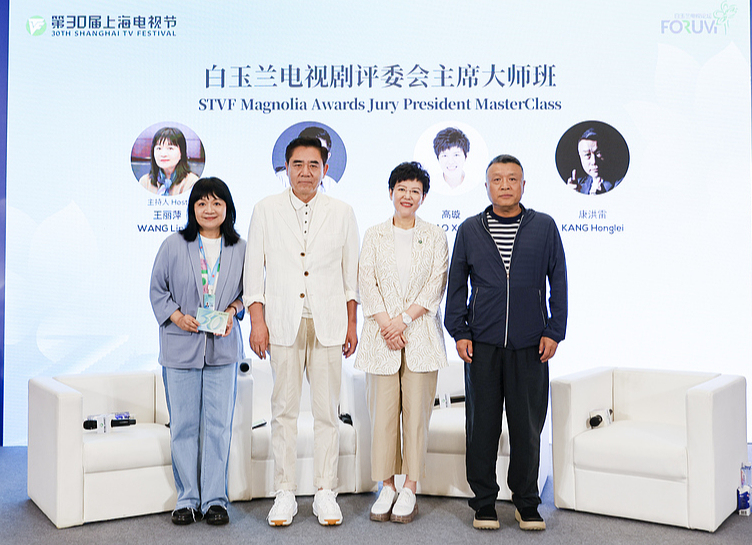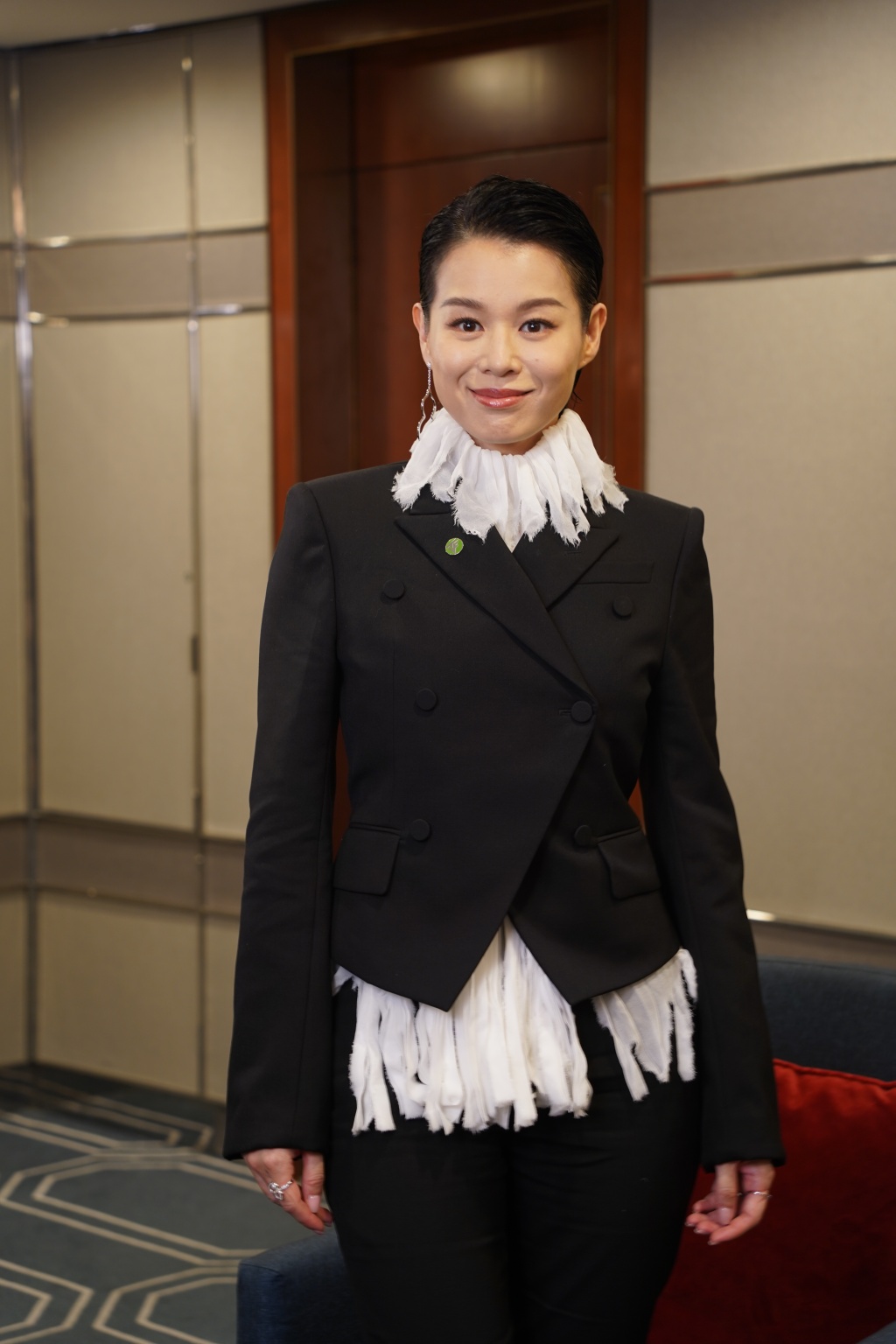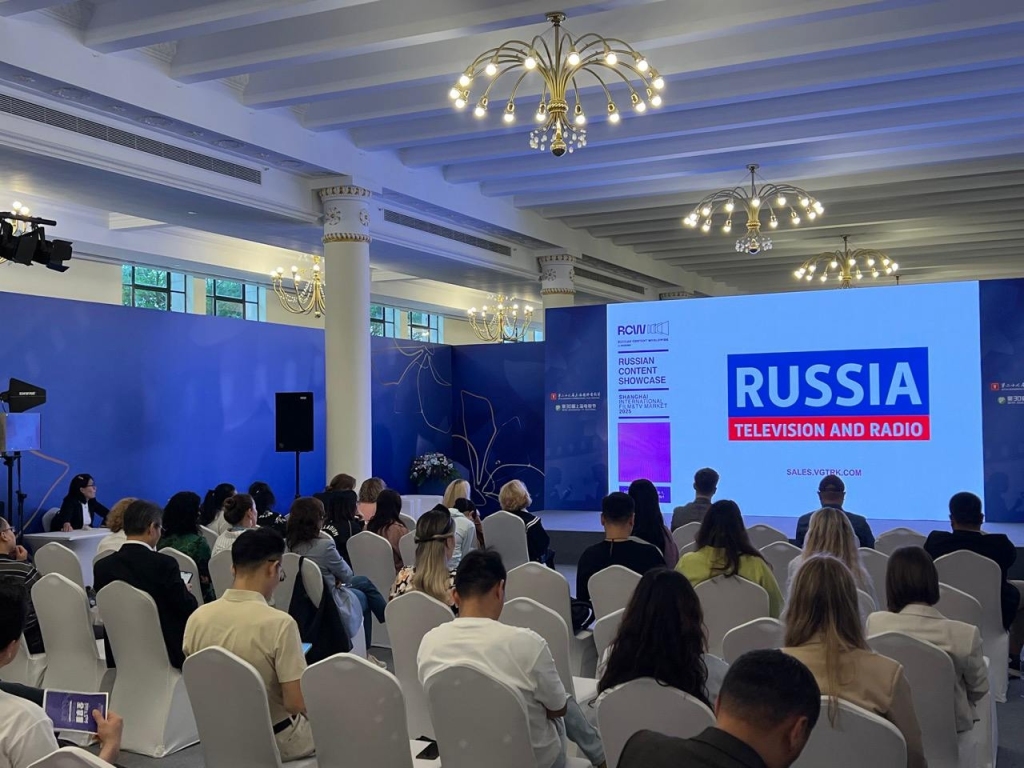
On June 23, the 30th Shanghai TV Festival Magnolia TV Forum TV Drama Jury Chairman's Master Class was held at the Shanghai Exhibition Center.
Chen Baoguo, chairman of the TV drama jury of this year's Magnolia Awards, attended the event with screenwriter Gao Xuan and director and screenwriter Kang Honglei, two judges of the Chinese TV drama unit. Screenwriter Wang Liping served as the host.
At the master class, the judges talked about the selection process of this year's Magnolia Awards, emphasizing the need to resonate with the audience in terms of content. They talked about their insistence on good scripts, and also talked about the hot debate between long and short plays in recent years, firmly believing that content is the foundation of work creation.

June 23, 2025, the 30th Shanghai TV Festival, Magnolia TV Drama Jury Chairman Master Class. From left: Wang Liping, Chen Baoguo, Gao Xuan, Kang Honglei.
“This year is a big year, not a good review”
Talking about the pressure of being the chairman of the jury, Chen Baoguo said, "I watched the movies for more than 20 days, and I couldn't help but watch until three or four o'clock in the morning every day. One reason was that I wanted to watch more, and the other was that I couldn't help but be drawn into it." He said frankly, "The overall nominated TV series this year are of a high standard, all at the same level. This year is not a small year, this year is a big year, and it is not well received. This is pressure. These nominated works , and their creators, should be the new generation of TV dramas, and they are better than their predecessors."
Kang Honglei said, "It is very gratifying to see the comprehensive abilities of many young artists, including their aesthetic orientation, their concern for patriotism and humanity, and that (the story) not only has a strong plot, but also a strong conflict."
Screenwriter Gao Xuan believes that "the audience's aesthetic taste has changed dramatically, and the aesthetic demand for film and television works is no longer static. Our creations should also become more diverse." We should always pay attention to the current network, social reality and people's livelihood issues, and discover topics that everyone is concerned about, related stories and characters. "Young screenwriters are better than us in keeping up with the pulse of the times and resonating with the current audience, so my predecessors, including those who are now considered middle-aged, are also working hard to learn from the audience and young screenwriters to promote the development of the entire industry."
Resonating with the audience is the "best reward"
Speaking of the classic reappearance of his masterpiece "The Mansion Gate", Chen Baoguo believes that the future vitality of TV dramas and their continued progress depends on the script. He said that he was lucky to meet the role of Bai Jingqi in "The Mansion Gate". "This script only comes once every 50 years, and now it has been nearly 30 years. Actors need to speak through the role, and where does the role come from? From the script. The script is the most important, the industry needs it, our actors and directors need it even more, and the audience also needs it." Chen Baoguo firmly believes in one sentence, "Acting is a learning and a science."
Looking back at "Soldier Assault", director Kang Honglei admitted that he used to work in the computer room every day from 7:30 in the morning to 10 o'clock in the evening, and he reviewed it many times. He believes that "your work is for people to watch. In the past, why should people watch it? Now I always ask my team, why should people watch you." In the current era of numerous media, Kang Honglei raised such a sharp question.
He analyzed, "Now there are many short videos with many comments below. I want to read the comments. Among these comments, there are a large number of young people commenting on the clips and lines in the play, including the relationship between the actors. Some parts are exactly the same as what you thought, and you feel very relieved, because after so many years, the audience today thinks exactly the same as you did back then, and the relationship between the characters is handled exactly the same. He recognizes and agrees, and I feel very relieved. Our work is not in vain, and it is not done and everyone laughs. This is the best comfort and the best reward."
When asked whether the selection of scripts in the era of big data would require the participation of the audience, Kang Honglei said, "Nowadays, a lot of it is market behavior, and the film and television industry is moving closer to the market and becoming more professional. We are moving forward in the future, the market is progressing, it is becoming more and more data-based, and more and more controllable. In such an environment, it is very important to ensure that the artistic nature is still flying and the divine communication is still in an instant."

Gao Xuan and Ren Baoru won the Best Original Screenplay Award at the 29th Shanghai TV Festival Magnolia Awards. Photo by Li Sijie, reporter of The Paper
Gao Xuan won the Magnolia Award for Best Original Screenplay with her partner Ren Baoru last year for her work on Imperfect Victims. She admitted, "After writing for so many years, I have become less and less courageous. Now, everything from choosing a topic to outlining an outline to forming characters relies heavily on experiencing life and interviewing people. Even though my partner and I are both half-experts in the legal subject, when we are involved in the judicial part of the play, we still have to ask the legal consultant again. Every line and every plot setting must be verified once to confirm that what I have mastered is correct before I dare to write."
Gao Xuan believes that today's screenwriters should "select topics based on reality". "We need to truly understand this society and immerse ourselves in every industry and every character, so that we can produce good works."
Chen Baoguo has his own considerations when choosing scripts from the perspective of an actor. He admits that career goals are different at different ages. "I remember that I was very young at that time, less than 30 years old, and there were two scripts in front of me, one was the TV series "Four Generations Under One Roof" and the other was the movie "The Whip". "Four Generations Under One Roof" is about the eldest son of the family, an intellectual, reserved, and introverted. The one in "The Whip" is ugly, bad, and fierce, and he lives at the bottom of the society, like a gangster on the dock." He chose the latter because "I may only have this opportunity in my life, and I will never have it again if I miss it."
Chen Baoguo even asked for a script on the spot: "I hope someone can write a script that is suitable for people of this age group and can act. I want the role. My desire to act has never been as strong as it is now."
Kang Honglei believes that good scripts are hard to come by. "Whether we are screenwriters, directors or actors, how can we make these people feel that they care about us? If there is such a script, I am willing to shoot it, even if I don't have to pay."
Chen Baoguo followed up: "We will perform even if we don't ask for money."
Acting should be done with heart, and it is taboo to act with appearance
It is not easy for an actor to get into the heart of a character. Chen Baoguo once had the experience of preparing for eight months but still not daring to act. He and other colleagues have discussed this indescribable and even embarrassing situation.
He believes that "sometimes there are many actors who don't dare to stand out when they haven't gotten into the heart of the play. When they put on the costumes, they don't know how to stand. They don't stand or sit properly. The heart is the window. When acting, you have to act with your heart. It's taboo to act with your face. I encourage my colleagues."
Kang Honglei also encountered embarrassment when filming "Qing Yi". "For the first time, I found that I don't understand women. I don't even understand their daily life. For example, I asked, Teacher Pan Hong, can you hold his hand and walk in the corridor? Teacher Pan Hong said, Director Kang, why should I hold hands? I couldn't answer, but I have seen it in my life. That was the most difficult."
He said frankly, "It's difficult to film about women... If I were asked to film now, I might not dare to do it. I was bold back then, but it was very difficult to film. That taught me a lesson. I hope female writers can write more penetrating stories."
Gao Xuan said, "The more you write about the present, the sharper it becomes, and the more controversial it becomes. I think this is also its significance. The times are not static, they are always improving. We share our learning process with everyone, and we are also educated by the audience. This process, this interaction is a very gratifying direction for domestic dramas today. We are learning from the audience. Our works do not stop after they are released. We do not provide an ultimate answer, but interact with the audience. When your work is completed, it is not a closed loop. You get a lot of feedback from the audience. When your work resonates with the times and the audience, it pushes the social issues you express forward a small step."
The story has its own length
Talking about the hot debate between long and short dramas in recent years, Kang Honglei said there is no need to panic. "Whether it is a long drama or a short drama, as long as you are serious, there are things that are not said. No matter how long it is, it is not too long. If a drama is like Baishui, you can watch it from beginning to end, no matter how short it is, it is too long. Everything depends on the content, the attention of the content, the heat and warmth of the content, and the empathy deep in everyone's heart and soul. This is very important. I don't care about the length or shortness, I care about the content."
"Stories have their own lengths, just like everyone's luck. Short plays and long plays have never been rivals, they can coexist." Gao Xuan believes, "As screenwriters of long plays, we must stick to and learn from short plays, which are the fast pace, strong emotions, and extreme plots. This is the current audience's aesthetic demand for a fast pace, and we must respect it."
She also added, "The profound expressions and complex characters of long plays are also impossible for short plays to have. Short plays now generally need to be refined, and there are still great deficiencies in logic and character completeness. When I watch short plays, I am often amazed by the shocking plots and the face-changing character creation, but I won't learn this. Short plays still have a long way to go. At the same time, what long plays can never replace is the profound expressions and complex characters. This is the eternal vitality of long plays. I think long plays will never die."


